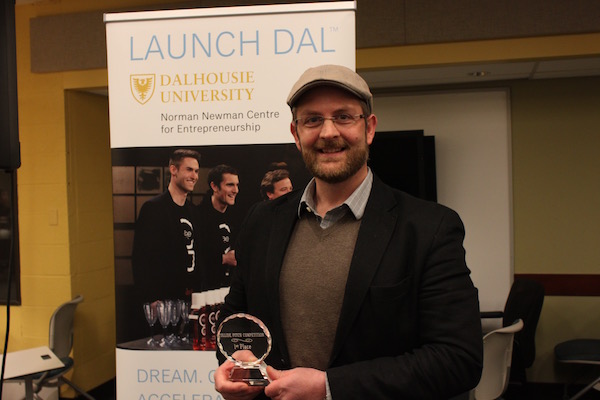One hallmark of Canada's East Coast is the bright, fluorescent buoys that fisherman release across our region’s oceans, freckling the Atlantic shorelines. But the ropes that link the buoys to the lobster and crab traps below are deadly hazards for marine life, especially for the endangered right whale.
Ashored Innovations, a young Halifax-based startup, aims to eliminate the risk of whale entanglement by designing a ropeless buoy system for smarter, sustainable fishing practices.
“We’re doing a bottom bound, ropeless fishing solution,” said CEO Aaron Stevenson, who co-founded the company with Maxwell Poole and Ross Arsenault.
“Instead of having the buoy floating at the top of the water, we’re going to be taking the rope and the buoy and holding that down next to the trap. When the boat is nearby, it’ll send a signal to it which will activate the release and allow the buoy to rise to the surface.”
Stevenson and Arsenault are currently enrolled in St. Mary’s University’s MTEI program. Ashored is their applied project.
The students are still building the prototype, which Stevenson hopes will include geo-tracking and data collecting technology, so fishers can locate lost or stolen traps.
“It would help the fisher improve their process by automating their records and also provide some historical context of past catches to help with trap placement to increase gain,” said Stevenson.
RovaultAI Wins China Program Pitching Competition
Ashored is one of six companies accepted into the first Startup Yard cohort at the Centre for Ocean Ventures and Entrepreneurship. The company was given $25,000 in non-dilutive funding to expand on the tech.
Stevenson said he also plans to go after NRC-IRAP and CICan funding to hire student interns.
He wants to recruit engineering students from The Nova Scotia Community College to help build a seaworthy prototype over the summer and prepare for beta tests in the fall.
“We’re enjoying and looking forward to the resources and mentoring opportunities it will provide and are looking forward to their capabilities,” said Stevenson about his future team.
“They’re going to be able to bring in a lot of talents and skills they've learned in this program that will really help us accelerate our technological development in the next four months.”
According to Stevenson, there are almost 30,000 lost or broken traps sitting in the region’s oceans. This can cost fishers thousands of dollars per year but it’s also contributing to the entanglement and demise of right whales.
Said Stevenson: “It’s a big deal from two perspectives. For the fisher, it’s the financial cost, the ropes, traps and buoys all have a cost. But there is also an ecological cost.”
Right now, there are around 450 right whales left in the world. With a record death toll of 18 whales last summer, 12 of which died in the Gulf of St. Lawrence, as well as zero recorded calves, ecologists and governments have cause for alarm.
Fishing gear entanglement is currently the main threat to right whales and scientists are racing to preserve this endangered species. With it’s ropeless solution, Ashored could help save these gentle giants.
“We really want to show the financial benefit to the fisherman,” said Stevenson “But really it’s the ecological benefit to society by protecting an endangered species.”










